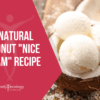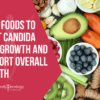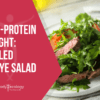Hemp: Is this Nutty Food Source with a Questionable Reputation Good for You?

What’s the real reason that nutritious hemp and hemp seed oil have a checkered past? Find out if the benefits of hemp outweigh its historical stigma.
Hemp seeds are a nutty food source considered by leading researchers to be one of the most nutritious superfoods on the planet…but US farmers are not allowed to grow them.
So what is all the buzz about hemp seeds and hemp seed oil?
What is Hemp, Really?
Hemp seeds come from the plant Cannibus sativa L. Sound kind of familiar? In fact, the hemp plant is often confused with the marijuana plant because they are of the same family (Cannibus) and closely resemble one another.
Because of this, hemp has had a checkered past and the debate continues even today.
The hemp “seed” is actually an achene: a simple dry fruit with a hard shell, just like sunflower seeds. It is considered one of the most versatile and economical plants, with many uses from food to biofuel.
Here are just some of hemp’s many uses:
- Food – Hemp seeds can be turned into hemp seed oil, butter, hemp milk and even flour. The list of food applications is endless. Over the years, hemp seeds have been part of the food supply in many cultures around the world. In parts of Asia, roasted hemp seeds are eaten as a snack, like popcorn (tasting similar to pine nuts).
Historically, the most famous hemp seed consumer was Buddha himself, who ate them during his fast of enlightenment.
- Fiber – Hemp is used to make a variety of materials from the coveted natural fibers of hemp fabricto rope, paper and building materials.
In fact, hemp was the fabric used in the original Levis jeans, but the fabric had to be abandoned by Levis due to lack of supply.
- Fuel – Hemp is considered one of the most efficient plants for biofuel as an alternative to gasoline. Woody Harrelson recently drew attention to the myriad of uses for industrial hemp by touring the West coast with a diesel bus run on hemp biofuel.
Benefits of Hemp Seeds
Hemp seeds are nutrient-powerhouses containing:
- All 20 amino acids, including the 9 essential amino acids (EAAs) our bodies cannot produce.
- A high protein percentage of thesimple proteins that strengthen immunity and fend off toxins.2
Eating hemp seeds in any form could aid, if not heal, people suffering from immune deficiency diseases. This conclusion is supported by the fact that hemp seed has been used to treat nutritional deficiencies brought on by tuberculosis, a severe nutrition blocking disease that causes the body to waste away.3
- Nature’s highest botanical source of essential fatty acid, with more essential fatty acid than flax or any other nut or seed oil. 4
- A perfect 3:1 ratio of Omega-6 Linoleic Acid and Omega-3 Linolenic Acid – for cardiovascular health and general strengthening of the immune system.
- A superior vegetarian source of protein considered easily digestible.
- A rich source of phytonutrients, the disease-protective element of plants with benefits protecting your immunity, bloodstream, tissues, cells, skin, organs and mitochondria.
- The richest known source of polyunsaturated essential fatty acids. 5
Hemp seed oil has been attributed to helping: increase energy, soften skin, relieve arthritis and normalize blood cholesterol.
So why does hemp carry a stigma?
The Stigma of Hemp
It’s all about the Cannibus species…the controversy is over how much THC (tetrahydrocannabinol, the psychoactive ingredient responsible for the “high” from smoking marijuana) is in hemp.
According to the hemp growers industry, industrial hemp grown for food, fuel and natural fibers contains virtually no THC (less than .3%).
In fact, when hemp is processed into hemp seed oil and hemp seed milk, for example, it further reduces the minute amount of THC in hemp.
And yet, there’s still a stigma due to the long-standing idea that hemp and marijuana are one in the same. Hemp is actually categorized with marijuana as part of the Controlled Substances Act of 1970 and is therefore illegal to grow in the US.
A few years ago, because of issues with drug testing, the US Drug Enforcement Administration (DEA) actually tried to pass a law banning the sale of hemp products (that were ingested or applied) in the US. This caused health food stores, like Whole Foods, to pull hemp products off the shelves. After additional research from Canada, it was found that drug tests did not confuse hemp and marijuana, nor did hemp products create the “high” associated with marijuana.
So where do we get our hemp?
Imports…industrial hemp is legal to grow in just about every industrialized country, so the US relies on imported hemp seeds from countries like Canada.
Whether you choose to consume hemp products or not, one thing’s for sure: there’s nothing that creates a better “high” than optimal health.
Sources:
- Kane, Mari. Basic Uses of Industrial Hemp: Food, Fuel, Fiber.
- ibid.
- Hemp Line Journal, July-August 1992, pp. 14-15, Vol. I No. 1, Lynn Osburn, HEMP SEED: THE MOST NUTRITIONALLY COMPLETE FOOD SOURCE IN THE WORLD.
- Czechoslovakia Tubercular Nutritional Study, 1955.
- Hemp is Hip, Hot and Happening, Utne, September-October 2004.
- Kane, Mari. Basic Uses of Industrial Hemp: Food, Fuel, Fiber.
- ibid.
- ibid.
- VandePanne, Valerie. Hemp Industry on Fire, Exploding marketplace stoked by DEA. September 24, 2004
- Hemp Line Journal, July-August 1992, pp. 14-15, Vol. I No. 1, Lynn Osburn, HEMP SEED: THE MOST NUTRITIONALLY COMPLETE FOOD SOURCE IN THE WORLD.
- Czechoslovakia Tubercular Nutritional Study, 1955








